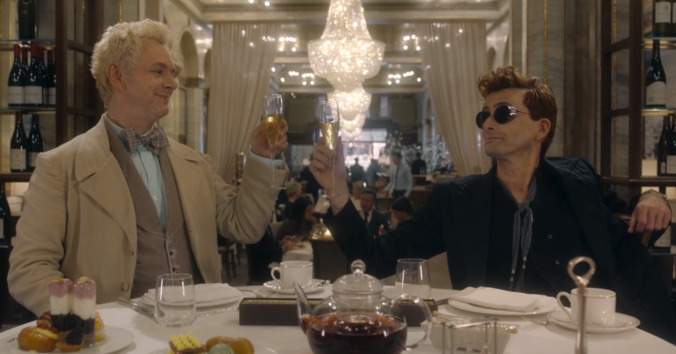In the Good Omens finale, the end of the world is a lot less interesting than what comes next


If there’s one moment in the novel Good Omens that most closely resembles co-author Terry Pratchett’s solo work—other than all those footnotes, anyway—it’s the bit in the big climax, when Aziraphale and Crowley realize that Adam Young’s unintentionally orthodox upbringing has transformed him, not into the epitome of good, or the epitome of evil, but into the epitome of people. It’s a very Pratchett idea (as is all the stuff with Dog that foreshadows it, and the way a hellish nature can’t stand up against a bit of Earthly nurture), and it’s rather lovely to see that moment be given some space here, in the final episode of the book’s three-decades-delayed TV adaptation. Pratchett liked people, for all the stupid, ugly chaos they could cause, and it’s in liking people that Adam Young finds the strength to save the world.
All of which is quite lovely to say. But it also demands a question: Does any of this feel-good philosophizing make for effective TV? The first half of “The Very Last Day Of The Rest Of Their Lives” unfortunately argues that it pretty much doesn’t, offering up a series of showdowns that mostly boil down to people staring meaningfully at each other until a bad guy suddenly explodes. There are moments of grace—as when Adam’s two celestial “godfathers” stop time to give him a brief pep talk before facing down Satan himself, or when the would-be Antichrist calmly stares down Beelzebub and Gabriel (Anna Maxwell Martin and Jon Hamm, the latter of whom is transcendent in this episode) as they try to bluster him into ending the world. But the Four Horseman, especially, go out as they lived, ostensibly good ideas that just didn’t work as TV.
Even the confrontation with The Big Man himself—voiced for two whole lines by Benedict Cumberbatch, and powered by CGI that did not, for once, look like absolute dogshit—is an anti-climax, pretty much by design. Adam thrice denies him, and there you go: Lord of the Pit defeated, final boss fight complete. Thematically, it makes sense. Practically, it’s just a teensy bit dull, no matter how many CGI rocks get tossed around in the process.
It’s lucky, then, that author and screenwriter Neil Gaiman clearly grasps that the end of the world is the least interesting part of this apocalyptic finale, which is why his script spends so much time on the question of what comes after, instead. (Or, to put it in the words of Agnes Nutter, witch: “Ye saga continuef.”) Mostly, this plays out in a series of happy endings, largely romantic, for our various heroes, with Newt and Anathema rejecting the chance to know any more about their future, and Shadwell and Tracy having a frank discussion about nipples. (Even knowing it’s coming, watching Michael McKean awkwardly work himself up to “popping the question” is a thing of great delight.) Everyone gets a moment to shine, from Newt finally getting to explain his terrible Dick Turpin joke—complete with a brief explainer for American viewers—to Miranda Richardson’s quietly confident “former Jezebel” when inviting Shadwell to share a bungalow (and a life).
But we end, of course, with the three characters we started this whole cosmically incompetent mess with: The renegade angel Aziraphale, the rogue demon Crowley, and that infernal little bundle of joy, Adam Young. For Adam, it’s brightly bittersweet; having chosen to be human, he now gets to, well, be human (mostly), complete with all the attendant consequences—like being grounded to the garden by his bewildered parents while the circus comes to town. And even though the “idyllic boyhood in pastoral England” parts of this show never really felt of a piece with the rest of its more cynical intentions, the last we see of Adam can’t help but pluck the heartstrings. Certainly, Frances McDormand redeems a great deal of this show’s frequently over-burdened narration with her read on the line about how “There never was an apple that wasn’t worth the trouble you got into for eating it.”
As for A & C, they get their (temporarily) happy ending, too, after executing a body-swapping gambit to get their respective former masters off their backs. (Given how clearly Agnes’ last prophecy telegraphs the switch, it’s hard not to wish we’d gotten more of David Tennant and Michael Sheen more blatantly imitating each other, but we’ll take what we can get.) It’s all a little silly, but we do get two exceptionally satisfying payoffs from it, so it’s hard to be too grouchy. The first is the final flex from Hamm as an incredibly pissy Gabriel, the only performance that really gives Sheen or Tennant a run for the series’ MVP. And the other is our final shot of Crowley and Aziraphale together: Dining at the Ritz, speculating that they might actually have done the Almighty’s true will after all, and toasting to their shared love: “To the world. “To the world.”
A good ending—and you could comfortably argue that this is a very good ending, emotionally satisfying without being too terribly cloying—can go a long way toward salvaging a troubled show. Good Omens was a frequently troubled show, often feeling like a collage of the book’s best bits, randomly assembled into some semblance of a story more-or-less at random. Gaiman seemed to gain more confidence in the material, and the strengths of the medium, as the series went on, though, relying less on his and Pratchett’s narration, and inserting more stylistic flourishes like the Aziraphale-Crowley friendship sequence that powered episode 3. The series was always messy, but in its best moments, it was gloriously messy, jumping between eras, following weird rabbit holes, and falling back (quite rightly) time and again on the charisma of Michael Sheen and David Tennant to keep the audience involved. It was far from perfect, but still, a world worth toasting, in the end.
Stray observations
- Of the bits not plucked from the book for this episode, I found myself most missing the digression about how thoroughly Agnes’ book (and its unerringly accurate prophecies) screwed her publishers, as well as the long history of prophetic blackmail she employed to keep the box safe and unopened.
- Pepper’s one-liner to War—“I believe in peace, bitch!”—provoked a viscerally unpleasant reaction in me.
- I cannot emphasize this enough: Jon Hamm’s Gabriel is one of the funniest things he’s ever done, from Crowley shooting down his smug “God does not play games with the universe” to the one-two pettiness punch of “I’m the archangel fucking Gabriel” and “Shut your stupid mouth and die already” during “Aziraphale’s” trial.
- “Just imagine how awful it might have been if we’d been at all competent.”—Aziraphale, summing up the entire show.
- Ineffable count: 6! It’s almost like God really does move in mysterious ways.
- And we end on a literally lovely note, as Gaiman’s old pal Tori Amos sings “A Nightingale Sang In Berkeley Square.” Thanks for taking the trip with me, folks. We ended up heading down a lot of weird little alleyways, but the journey still felt worth it, all the same.